
Patrick Pelloux (born 19 August 1963 in Villeneuve-Saint-Georges, Val-de-Marne) is a French physician and activist. He is a specialist of emergency medical services.

Patrick Pelloux (born 19 August 1963 in Villeneuve-Saint-Georges, Val-de-Marne) is a French physician and activist. He is a specialist of emergency medical services.
Patrick Pelloux became well known in France during the 2003 European heat wave, as he was the first to point out that thousands of people were dying, though the French authorities denied it. [1]
Since 2004, he has written articles in Charlie Hebdo , a satirical newspaper, on the work of an emergency physician. [1]
Since 2008, he has been chairman of Association des médecins urgentistes de France (a French trade union for emergency physicians). He is opposed to bullfighting.
During the Charlie Hebdo shooting, on 7 January 2015, he was near the magazine's building, so he was one of the first people on the spot after the shooting, having been called by someone who worked for the magazine. He immediately phoned French President François Hollande to tell him what had happened. He saw that some of his friends were dead and provided first aid to the others. [2]
Charlie Hebdo is a French satirical weekly magazine, featuring cartoons, reports, polemics, and jokes. Stridently non-conformist in tone, the publication has been described as anti-racist, sceptical, secular, and within the tradition of left-wing radicalism, publishing articles about the far-right, religion, politics and culture.
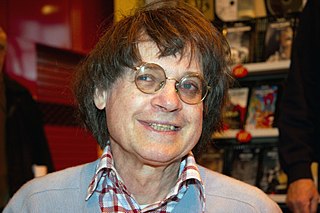
Jean Maurice Jules Cabut, known by the pen-name Cabu, was a French comic strip artist and caricaturist. He was murdered in the January 2015 shooting attack on the Charlie Hebdo newspaper offices. Cabu was a staff cartoonist and shareholder at Charlie Hebdo.

Georges David Wolinski was a French cartoonist and comics writer. He was killed on 7 January 2015 in a terrorist attack on Charlie Hebdo along with other staff.
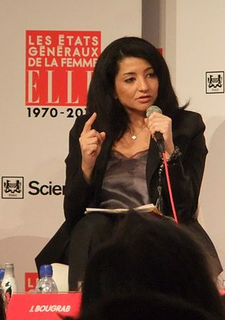
Jeannette Bougrab is a French lawyer and politician of the UMP who served as the junior minister for Youth and Community Life in the government of Prime Minister François Fillon from 2010 to 2012. Prior to this, she was the Chair of the French Equal Opportunities and Anti-Discrimination Commission (HALDE) from 16 April 2010 to 14 November 2010.

On 7 January 2015, at about 11:30 a.m. CET local time, two French Muslim brothers, Saïd and Chérif Kouachi, forced their way into the offices of the French satirical weekly newspaper Charlie Hebdo in Paris. Armed with rifles and other weapons, they killed 12 people and injured 11 others. The gunmen identified themselves as belonging to the Islamic terrorist group al-Qaeda in the Arabian Peninsula, which took responsibility for the attack. Several related attacks followed in the Île-de-France region on 7–9 January 2015, including the Hypercacher kosher supermarket siege, where a terrorist killed four Jewish people.

Stéphane Jean-Abel Michel Charbonnier, better known as Charb, was a French satirical caricaturist and journalist. He was assassinated during the Charlie Hebdo shooting on 7 January 2015.
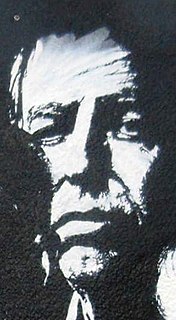
Bernard Henri Maris, also known as "Oncle Bernard", was a French economist, writer and journalist who was also a shareholder in Charlie Hebdo magazine. He was murdered on 7 January 2015, during the shooting at the headquarters of the magazine in Paris.

Philippe Paul-Louis Juste Honoré, known by the pen-name Honoré, was a French cartoonist and a long-time staff member of Charlie Hebdo.

"Je suis Charlie" is a slogan and logo created by French art director Joachim Roncin and adopted by supporters of freedom of speech and freedom of the press after the 7 January 2015 shooting in which twelve people were killed at the offices of the French satirical weekly newspaper Charlie Hebdo. It identifies a speaker or supporter with those who were killed at the Charlie Hebdo shooting, and by extension, a supporter of freedom of speech and resistance to armed threats. Some journalists embraced the expression as a rallying cry for the freedom of self-expression.
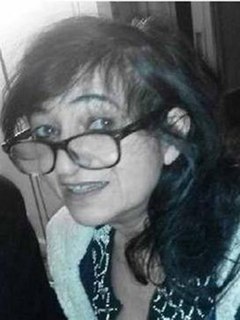
Elsa Jeanne Cayat was a French psychiatrist and psychoanalyst and a columnist for the satirical newspaper Charlie Hebdo in Paris, France. She was one of 12 victims of the Charlie Hebdo attack and was killed along with the seven journalists, maintenance worker, one visitor and two police officers. She was the only woman working for Charlie Hebdo to die in the attack. She was one of two Jews killed in the attack, along with Georges Wolinski.
Fabrice Nicolino is a French journalist.

Laurent "Riss" Sourisseau is a French cartoonist, author and publisher. Since 1992, he has worked for the French satirical weekly newspaper Charlie Hebdo and is now its majority owner.

On 9 January 2015, Amedy Coulibaly, armed with a submachine gun, an assault rifle, and two Tokarev pistols, entered and attacked a Hypercacher kosher supermarket in Porte de Vincennes in Paris, France. There, Coulibaly murdered four Jewish hostages and held fifteen other hostages during a siege in which he demanded that the Kouachi brothers not be harmed. The siege ended when police stormed the supermarket, killing Coulibaly. The attack and hostage crisis occurred in the wake of the Charlie Hebdo shooting two days earlier, and concurrently with the Dammartin-en-Goële hostage crisis in which the two Charlie Hebdo gunmen were cornered.

The Republican marches were a series of rallies that took place in cities across France on 10–11 January 2015 to honour the victims of the Charlie Hebdo shooting, the Montrouge shooting and the Porte de Vincennes siege, as well as to voice support for freedom of speech and freedom of the press. French government officials estimated that the rallies were attended by up to 3.7 million people nationwide, making them the largest public rallies in French history. By their broad appeal, they were the first mass movement of their kind since 1944, when Paris was liberated from the Germans at the end of World War II.

Charlie Hebdo issue No. 1178 was published on 14 January 2015. It was the first issue after the Charlie Hebdo shooting on 7 January 2015, in which terrorists Saïd and Chérif Kouachi killed twelve people. The edition was put together by surviving Charlie Hebdo cartoonists, journalists, and former contributors and was prepared in a room in the offices of Libération. The issue's print run of 7.95 million copies became a record for the French press. The publication sparked protests by Muslim demonstrators in Yemen, Pakistan, Mauritania, Algeria, Mali, Senegal, Niger, Chechnya, and other countries. In Niger, violent protests led to 10 deaths.

From 7 to 9 January 2015, terrorist attacks occurred across the Île-de-France region, particularly in Paris. Three attackers killed a total of 17 in four shooting attacks, and police then killed the three assailants. The attacks also wounded 22 other people. A fifth shooting attack did not result in any fatalities. Al-Qaeda in the Arabian Peninsula claimed responsibility and said that the coordinated attacks had been planned for years. The claim of responsibility for the deadly attack on the magazine came in a video showing AQAP commander Nasr Ibn Ali al-Ansi, with gunmen in the background that were later identified as the Kouachi brothers. However, while authorities say the video is authentic, there is no proof that AQAP helped to carry out the attacks. Amedy Coulibaly, who committed another leg of the attacks claimed that he belonged to ISIS before he died.

Richard Malka is a French lawyer, comics writer and novelist. As lawyer Malka in 2007 successfully defended Charlie Hebdo editor Philippe Val against charges of racism following the magazine's publication of Mohammad caricatures. Other clients include Clearstream, Dominique Strauss-Kahn and Caroline Fourest.
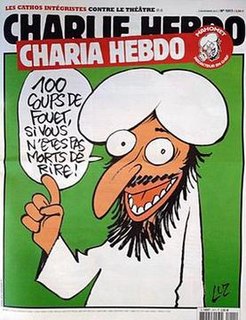
Charlie Hebdo issue No. 1011 is an issue of the French satirical newspaper Charlie Hebdo published on 2 November 2011. Several attacks against Charlie Hebdo, including an arson attack at its headquarters, were motivated by the issue's cover caricature of Muhammad, whose depiction is prohibited in some of interpretations of Islam. The issue's subtitle Charia Hebdo references Islamic sharia law.

Zineb El Rhazoui is a Moroccan-born French journalist. She was a columnist for Paris-based satirical magazine Charlie Hebdo from 2011 to 2017. She was in Morocco during the Charlie Hebdo massacre on 7 January 2015.
Mustapha Ourrad was a French Algerian copy editor, killed during the 2015 Charlie Hebdo shooting.